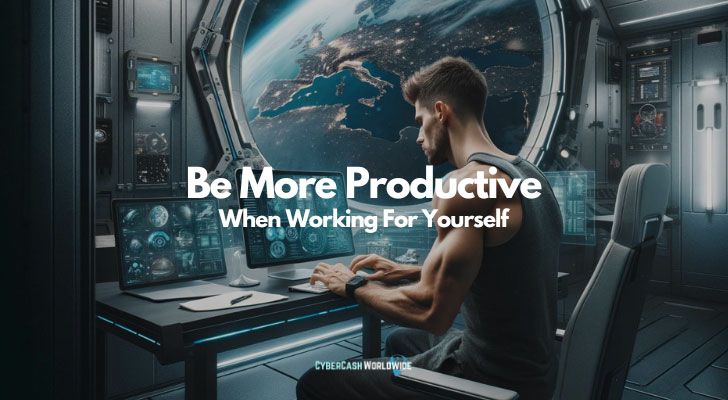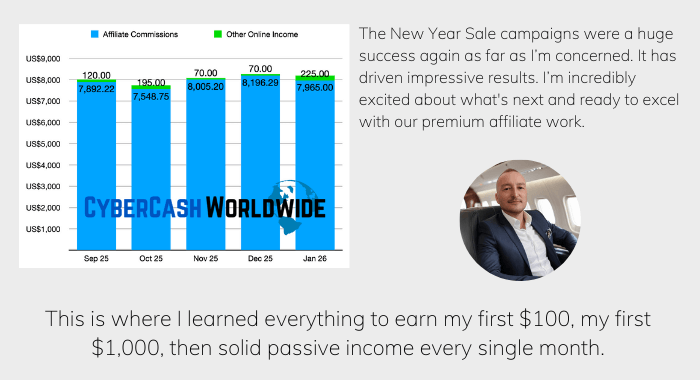Work-from-home-for-yourself environment gives you all the freedom of your choice. And of course it also means it’s entirely up to you to control the amount of work, maintain the quality of work and continually find motivation to work. Especially as an online marketer, virtually all your working hours are spent by sitting and staring at the screen. It can be difficult to keep focusing on what you do when you're all your own in your home office. Here’s how to be productive and how to avoid physical and mental exhaustion.
Did You Know?
- Workplace Productivity: Disorganized workers can spend up to one hour per day searching for misplaced items, affecting productivity.
- Stress Levels: A study by the National Association of Professional Organizers found that 54% of Americans are overwhelmed by clutter and don’t know how to manage it.
- Time Management: Approximately 43% of adults categorize themselves as disorganized, and 21% have missed crucial work deadlines due to disorganization.
- Income Impact: A survey indicated that people who describe themselves as disorganized were more likely to earn less than $35,000 annually.
- Mental Health: Clutter and disorganization can significantly increase stress and anxiety levels, according to a study published in the Personality and Social Psychology Bulletin.
#1 Set A Few Big Goals To Achieve
Is This You?
- Is your vision for the future defined by a handful of significant achievements?
- Do you feel driven by a few major goals rather than many small ones?
- Are your ambitions focused on achieving big, impactful milestones?
- Do you prioritize long-term success over immediate gratification?
- Is your motivation fueled by the pursuit of substantial accomplishments?
Setting long-term goals, and visualizing yourself in 3 years - 5 years' time, may actually be things in the past. In this fast-paced world, conventional long-term planning can give a false sense of security. By sticking to one plan for a long time, there's a possibility to end up seeing an unsuccessful result. What you need is flexibility and to be prepared to explore new channels.
Ability to seek another opportunity very quickly in case your original plan doesn’t work. Plans B, C and D.
In order to stay agile and competitive, set a few main goals, and also set some sub-goals including alternative plans. The sub-goals should be realistic to your current self. They should be reasonably feasible for you. Work towards them and monitor your progress periodically.
#2 Make a To-Do List and Set Priorities
Is This You?
- Is your day structured around a clear, prioritized to-do list?
- Do you find yourself regularly assessing tasks to determine their importance?
- Are you adept at identifying what needs to be done first to be productive?
- Is organizing your tasks into a list a crucial part of your planning process?
- Do you believe in the power of prioritization to enhance your efficiency?
Working on a first-come, first-served basis is not an efficient way to get the best results. Create a to-do list weekly. But making a list is not a task in itself. The list will only help you organize the way you work. So don’t be too pedantic and spend too much time on this.
- List up things to do one after another in no particular order.
- Mark the top 3 tasks (leave an asterisk * for example).
- You can add new tasks any time during the week.
- Review the list at the end of every day and cross out as you accomplish.
As you create a new weekly to-do list and bring forward unfinished tasks from the previous week, you’ll know what needs attention the most, what can wait, and also what’s unlikely to be achieved. You’ll see a bigger picture as you rewrite your list weekly. But don’t overcommit yourself to the list. List-making is not something you should be obsessed with and it certainly shouldn’t cause stress and anxiety.
Did You Know?
- Sleep Quality: A study in the journal Sleep found that people with cluttered bedrooms took longer to fall asleep and had poorer sleep quality.
- Decision Fatigue: Constant clutter can lead to decision fatigue, reducing the capacity to make informed decisions.
- Lost Items: The average American spends 2.5 days each year looking for lost items, collectively costing U.S. households $2.7 billion annually in replacement costs.
- Efficiency at Work: 23% of adults say they are late to meetings because they misplace items or documents.
- Relationships: According to a study, around 55% of Americans report that disorganization causes significant strains in their relationships.
#3 Reflect On Your Progress Daily & Weekly
Is This You?
- Do you take time each day to review what you've accomplished?
- Is setting aside time weekly to reflect on your progress important to you?
- Are you committed to assessing your achievements and areas for improvement regularly?
- Do you believe in the value of daily and weekly self-reflection for personal growth?
- Is introspection a key tool in your strategy for achieving goals?
Reflection at the end of each day and also each week will keep you motivated. List the things you achieved, and what you didn't do well. The main thing is not to get depressed about what you didn't achieve or things that you feel reluctant to do.
It's only whether to keep going and complete or give up. If you really want it, you can do it. But you are the decision maker. Follow your instinct, and get rid of the jobs you really don't want from your list!
#4 Declutter (Your Workspace, At Least)
Is This You?
- Is maintaining a tidy and organized workspace a priority for you?
- Do you believe that a clutter-free environment significantly boosts your productivity?
- Are you proactive about removing unnecessary items from your work area?
- Is the physical organization of your workspace reflective of your mental clarity?
- Do you feel that decluttering your space is the first step to decluttering your mind?
Firstly and most definitely, we can all agree that a clean office environment increases productivity. Clutter can distract you and cause you to feel more stress and guilt. If your working space is as bad as a landfill site, you need to spend a good few hours clearing out things that you never use. Minimalism will not only improve your work stance but also improve your life as a whole. Too many things = spend too much time cleaning.
If you spend the majority of your time on the internet, you don't need anything on your worktop surface except a few items such as;
- Laptop/Desktop
- Notebook and pen
- Cellphone/tablet - only if you need it!
Everything else should be put away in the drawer. You might need a book/magazine/newspaper for reference purposes, a calculator, or coffee at times, but as soon as you finish with them, move them away from your desk. Keep your desk free of dust too. Hygiene will help you focus on your work!
#5 Don't Get People To Distract You
Is This You?
- Are you vigilant in minimizing interruptions from others while working?
- Do you set boundaries with people to maintain your focus?
- Is avoiding distractions from others a key part of your work ethic?
- Do you proactively communicate your need for uninterrupted work time to others?
- Is your productivity shielded from the potential disruption caused by people around you?
Your cell phone can be put under the desk too. You don't want phone calls and text messages to interrupt your work. Once or twice a day, fine. But no more frequently than that. I keep my phone away, which is synced to my Mac. So I know who's calling, and only answer if it is urgent. I can text back from my laptop.
Did You Know?
- Health Risks: Disorganization and clutter have been linked to higher cortisol levels, which can affect physical health over time.
- Eating Habits: People in cluttered environments are more likely to choose unhealthy snacks, contributing to potential health issues, as per a study in the journal Environment and Behavior.
- Exercise Frequency: A Princeton University study found that cluttered environments can negatively impact one's ability to focus on health goals, including exercise.
- Digital Disorganization: Over 65% of digital workers say they spend significant time every week dealing with digital clutter, impacting productivity.
- Attention and Concentration: Clutter can reduce one’s ability to concentrate and process information, according to a study in the Journal of Neuroscience.
#6 Don’t Try To Fill Your Day For The Sake Of It
Is This You?
- Do you resist the urge to pack every minute with tasks?
- Is having breathing room in your schedule a priority for you?
- Are you mindful about not over-scheduling yourself just to feel busy?
- Do you value quality of work over quantity of tasks completed?
- Is your approach to productivity focused more on effectiveness than busyness?
Many people in employment are obsessed with the number of hours they work, rather than focusing on the quality of work to accomplish. Since you're working for yourself, you should be aware of when to stop. You just need to work according to your to-do list.
If you have 6 hours of work scheduled in the afternoon, then that's your time. If you've completed your task earlier than anticipated, the decision is up to you to move on to the next task, to finish your work for the day. Don’t try to fill your time to the point of overflowing, just to stay busy or feel productive.
#7 Get Some Exercise In The Morning
Is This You?
- Do you start your day with a workout to boost energy?
- Is a morning exercise routine a non-negotiable part of your day?
- Do you believe that physical activity in the morning enhances your focus?
- Are you convinced that early workouts contribute to a better day?
- Is getting your heart rate up first thing a key to your productivity?
Morning is the best time to get some exercise. Cardio exercises such as running, swimming, and biking are great as well as Yoga. But if you're not a fan of morning workouts, you can take 10-20 minutes of brisk walking at the start of each day. The exercise will certainly wake you up, boost your motivational level (serotonin, dopamine, endorphins) dramatically, and help you to get a productive day started.
#8 Have At Least One Healthy Snack
Is This You?
- Do you make a point to include a nutritious snack in your day?
- Is choosing healthy options over junk food a habit for you?
- Are you conscious about the nutritional value of your snacks?
- Do you see a healthy snack as an essential part of your diet?
- Is fueling your body with good food a priority for you?
If you already maintain your healthy eating habit then that’s great. But if you’re not that sort of type and not even good at nutrition and a “balanced-diet” and stuff, this can help you...instead of eating junk food or deep-fried snacks. You can have it as a lunch, or just pick a modest amount as an in-between afternoon snack.
Choose either of the following - (a) vegetables or (b) something fat-free. Eat either (a) or (b) with a glass of water.
If you choose to go for (a), for example, eat some carrot sticks or broccoli - boiled or raw. You can dip it in mayonnaise, salsa, sour cream, or anything you want.
If you choose to go for (b), for example, toast with jam but without butter or margarine, baked potato, and sweetcorn but only with salt or fat-free dressing, pasta with fat-free salsa.
In all honesty, neither of the options is exactly the best course of diet, but they both have a healthy element; (a) being a source of some vitamins, and (b) being “eat less fatty food”. Keep trying every day for a while and at you’ll stay away from junk food or unnecessary snacking habits.
Did You Know?
- Learning Abilities: Disorganized spaces can affect children’s learning and play activities, impacting their development and stress levels.
- Professional Image: 42% of surveyed professionals believe that disorganization reflects poorly on a colleague’s professional image.
- Memory: Clutter and disorganization can negatively impact memory and cognitive function, making it harder to remember tasks and appointments.
- Creative Thinking: A cluttered environment can stifle creativity, making it difficult for individuals to think expansively or generate new ideas.
- Work-Life Balance: Disorganization can blur the lines between work and personal life, especially for remote workers, leading to longer work hours and less personal time.
#9 Work Is Not Everything
Is This You?
- Do you maintain a balance between your work and personal life?
- Is finding time for hobbies and relaxation as important to you as work?
- Are you aware of the importance of disconnecting from work to recharge?
- Do you believe in the significance of life outside the office?
- Is setting boundaries between your professional and personal life crucial for you?
Work is only one aspect of life. It’s great if you’re passionate enough to spend so much time of day concentrating on what you love and making money. But if you start neglecting other ordinary things in life, it’s an amber alert! You shouldn’t isolate yourself from the outside world; friends, family and social events, fitness routines, shopping, media communications (e.g. watching news).
Shutting out yourself from anything other than work means your opportunity for inspiration and motivation will be dramatically restricted. You may risk damaging your mental health in the long run. It’s important to break out of the monotony, maintain work/life balance, and discover new things.
#10 Ask For Help!
Is This You?
- Do you feel comfortable reaching out for assistance when needed?
- Is asking for help something you see as a strength, not a weakness?
- Are you proactive in seeking support or advice to solve problems?
- Do you recognize the value of collaboration and teamwork in achieving goals?
- Is your approach to challenges collaborative, knowing that you don't have to go it alone?
Are you completely working on your own? Do you have a mentor or anyone in the same industry you can talk to? If you feel you're at a standstill, it's time to communicate your problem.
Before asking for help, write down 4 things about the problem. No. 1 - No. 3 in order for you to explain clearly, and No. 4 for yourself to clarify what others may be able to help you.
- The problem you have.
- The cause(s) of the problem - if you have many, only list up a few major factors, so that others can understand easily when you explain.
- What you have tried so far - if you have many, minimize the number!
- What you want them to do - you want them to give you advice, but deep in your heart what you really want them to say.
Do you want to join an internet marketing community where you can receive affiliate boot camp training, tips, and advice from other experts? We are here to help!






Great advice Ray! It’s so easy to become lazy and neglect exercising and eat healthy food when working online. I will follow exactly you suggest. Thanks!
Thanks Herman, I appreciate your comment. I wish you the best of luck with every success with your business!